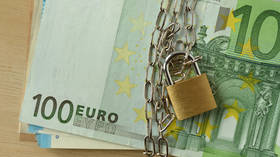Germany opposes EU plan to transfer Russian assets – FT
EU officials have been debating ways of confiscating the funds and sending them to Ukraine

Germany has raised objections to Brussels’s plan to use frozen Russian Central Bank assets for Ukraine’s reconstruction, warning of the legal and financial risks arising from such a move, the Financial Times reported on Monday.
The European Commission has been working on a plan to raise billions of euros by requiring financial institutions holding immobilized Russian assets to hand over some of the profits they generate. However, many lawmakers from across the bloc have pointed out that the EU legal system only allows the assets to be frozen, not expropriated.
According to the FT, senior German government officials voiced doubts that the EU's plan can win sufficient support, due to the legal risks.
A Foreign Ministry official reportedly said Moscow “will have to pay for the damage it has caused in Ukraine” and insisted that Germany was doing “everything it legally can” to locate and freeze the assets of sanctioned Russian individuals and companies. The official, however, noted that the idea of using Russian funds for Ukraine’s reconstruction raised “complex financial and legal questions.”
“It opens a can of worms,” another German official warned, adding that if the EU took money from the Russian Central Bank or reaped the profits from investing the funds, it would set a precedent for others to pursue, such as Poland, with its World War II reparation claims against Berlin.
An unnamed official told FT that Germany’s Justice Minister Marco Buschmann had studied the EU proposals for harvesting Russian Central Bank assets, and concluded they were legally unworkable.
At a meeting with the European Commission last week, several diplomats reportedly urged caution on the proposal.
The EU and its allies have frozen hundreds of billions of euros of Russian Central Bank assets as part of the sanctions policy. Officials have so far rejected calls to confiscate the assets outright, and have instead looked for ways to harvest some of the proceeds for Kiev, FT wrote.
The report indicated that one option is for securities depositories to be required to make a windfall contribution from the profits generated, when they reinvest the proceeds of frozen Russian assets.
Kiev reportedly believes the EU could raise €3 billion ($3.2 billion) a year from Russian Central Bank assets. According to a senior Ukrainian official, it was also looking at an alternative scheme, whereby the commission could use seized Russian assets as collateral against which it could borrow to invest for a return, which would be designated for Kiev.
“The challenge is to try to work out what is legally sound and defensible,” according to one EU diplomat involved in the discussions, who added: “It’s more complex than anybody thought at the outset.”
Foreign ministers from the 27-nation bloc are expected to discuss the issue at a meeting in Luxembourg on Monday, officials involved in the planning of the meeting told the FT.
Moscow has repeatedly condemned the EU’s seizure of its assets as theft. While addressing the St. Petersburg International Economic Forum earlier this month, Russian President Vladimir Putin described the measure as “medieval.”
https://www.rt.com/business/578720-germany-eu-russian-assets-ukraine/


0 Comments:
Post a Comment
Subscribe to Post Comments [Atom]
<< Home